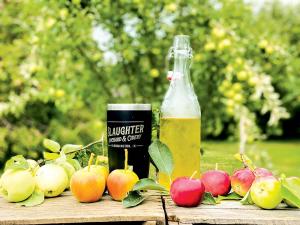Ground-Harvest Apples Used For Hard Cider
 ✖  |
Slaughter Orchard & Cidery has been awarded a USDA Speciality Crop Block Grant for furthering the use of ground-harvested apples for hard cider. These annual grants are available for both for-profit and not-for-profit organizations and work to fund specialty crop research, education, and market development. With it, the Cidery will research better ground-apple production methods and teach other orchards, cider mills and cideries what they learn.
This $163,000 grant will run for 2 years and includes research, an educational position paper, a model HACCP plan, and in-orchard demonstration days. Slaughter’s orchard and apple processing research will take place at Hainlen Orchard in Converse, Ind., while the fermentation research will be centered at the Bloomington, Ind., Cidery.
Things are moving smoothly so far. “The ground-harvest grant is making steady progress, and this fall will be our first ground apple harvest,” says head orchardist and cidermaker Clay Slaughter. “We expect to start having preliminary results next spring and full results later next year. Next year, we’ll also host our orchard demonstration days for anyone interested in learning more about the grant.”
Slaughter believes this research offers a lot of potential for the fruit industry. “Ground-harvested apples have several benefits, including the ability to use fruit that would otherwise be wasted,” he says. “Most orchards do not use apples once they fall to the ground, so it creates waste for the orchard. Using these ground apples creates another revenue source instead.” Another benefit is an increase in specialty cider varieties. “Most cideries cannot source enough bittersharp and bittersweet apples to make hard cider due to low supply,” he explains. “By utilizing all the cider apples, both hand and ground fruit, we’re able to have a larger supply of these specialty apples.”
Slaughter shares that the biggest challenge remains ensuring that the harvesting, processing, and fermentation processes are done in ways that keep the ground apples and cider well separate from any hand apples and unpasteurized cider (juice). “The process of fermenting non-alcoholic sweet cider into hard cider makes it safe to drink,” he says.
Looking forward, Slaughter Orchard & Cidery plans to continue passing on any breakthroughs they make in the research process. “We hope to continue educating orchards, cider mills, cideries, and the public about the benefits of utilizing apples that would otherwise become waste,” says Slaughter. “We’ll also look for other opportunities to support orchards and cideries through research.”
Contact: FARM SHOW Followup, Slaughter Orchard & Cidery, 7288 IN-45, Bloomington, Ind. 47403 (ph 812-727-7778; www.slaughterorchard.com).

Click here to download page story appeared in.
Click here to read entire issue
Ground-Harvest Apples Used For Hard Cider CROPS New Techniques Slaughter Orchard & Cidery has been awarded a USDA Speciality Crop Block Grant for furthering the use of ground-harvested apples for hard cider These annual grants are available for both for-profit and not-for-profit organizations and work to fund specialty crop research education and market development With it the Cidery will research better ground-apple production methods and teach other orchards cider mills and cideries what they learn This $163 000 grant will run for 2 years and includes research an educational position paper a model HACCP plan and in-orchard demonstration days Slaughter’s orchard and apple processing research will take place at Hainlen Orchard in Converse Ind while the fermentation research will be centered at the Bloomington Ind Cidery Things are moving smoothly so far “The ground-harvest grant is making steady progress and this fall will be our first ground apple harvest ” says head orchardist and cidermaker Clay Slaughter “We expect to start having preliminary results next spring and full results later next year Next year we’ll also host our orchard demonstration days for anyone interested in learning more about the grant ” Slaughter believes this research offers a lot of potential for the fruit industry “Ground-harvested apples have several benefits including the ability to use fruit that would otherwise be wasted ” he says “Most orchards do not use apples once they fall to the ground so it creates waste for the orchard Using these ground apples creates another revenue source instead ” Another benefit is an increase in specialty cider varieties “Most cideries cannot source enough bittersharp and bittersweet apples to make hard cider due to low supply ” he explains “By utilizing all the cider apples both hand and ground fruit we’re able to have a larger supply of these specialty apples ” Slaughter shares that the biggest challenge remains ensuring that the harvesting processing and fermentation processes are done in ways that keep the ground apples and cider well separate from any hand apples and unpasteurized cider juice “The process of fermenting non-alcoholic sweet cider into hard cider makes it safe to drink ” he says Looking forward Slaughter Orchard & Cidery plans to continue passing on any breakthroughs they make in the research process “We hope to continue educating orchards cider mills cideries and the public about the benefits of utilizing apples that would otherwise become waste ” says Slaughter “We’ll also look for other opportunities to support orchards and cideries through research ” Contact: FARM SHOW Followup Slaughter Orchard & Cidery 7288 IN-45 Bloomington Ind 47403 ph 812-727-7778; www slaughterorchard com
To read the rest of this story, download this issue below or click
here to register with your account number.







